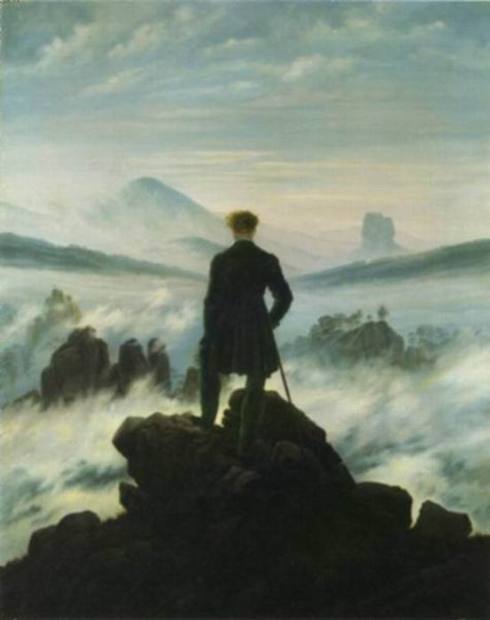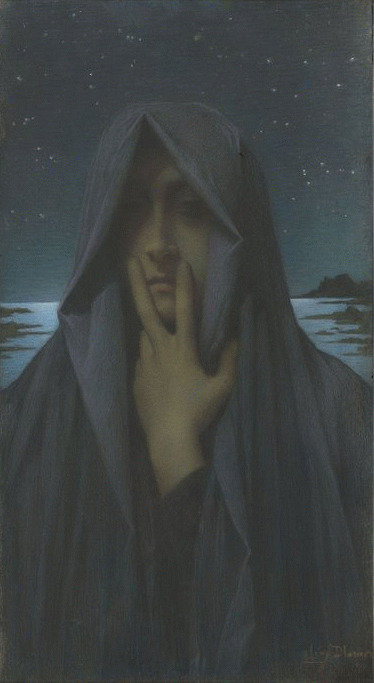You are currently browsing the monthly archive for February 2010.
“It’s a word which has been discredited by the Romantics. I don’t see it as a state of grace nor as a breath from heaven but as the moment when, by tenacity and control, you are at one with your theme. When you want to write something, a kind of reciprocal tension is established between you and your theme, so you spur the theme on and the theme spurs you on too. There comes a moment when all obstacles fade away, all conflicts disappears, things you never dreamt of occur to you and, at that moment, there is absolutely nothing in the world better writing. That is what I would call inspiration.”
(Gabriel Garcia Marquez, The Fragrance of Guava)
No use for Calliope there then.
Hello dear blog, do you think someone timed our tutorial week with the Winter Olympics on purpose? Like someone actually wants me to fail? No of course not, but pretty typical huh? It is also at times like these that one grieves that one is not in one’s Home Country. Here, no one seems to be particularly interested in what goes on in Vancouver. Except the sports that aren’t really sports at all, like luge and ski jump (it’s funny how TV here tries to sell the winter games trough brain scans of head injuries). I am trying not to get too caught up in it, or in anything else except school work. It’s going…uhm, not so well.
On the reading front I have just finished If on a Winter’s Night a Traveller, which is the kind of book I used to love. I think Calvino might even have played a tiny part in my decision to do an English degree (actually, that’s a complete lie. I don’t think there ever was a decision being made about that. If there was, I sure wasn’t there when it happened). Reading it now, again, makes me realise how much I have changed as a reader. Gone is the curiosity, the naïveté, the wish to be impressed by the book. Now I’m critical, judgemental and trying more to impress myself and others with my reading. What used to be an intimate relationship between a book and a reader, quietly seated opposite each other, is now a chaotic dance party where both the book and the reader is drowning in loud beats and overwhelming commotion. It’s a crowded dance with contexts Historical, Cultural and Political. Arrhythmical shouts of recommended readings, essay-questions, course-criteria and grade requirements fill the air around us. Deconstruct relatively, psychoanalyse pragmatically, romanticise inconsistently, all of us are raving uncontrollably. Think, don’t think, think again, respond, react, compare, contrast, extract value, apply value. Don’t let stylistic flair deceive you, always be critical. But hey now, wait a minute. What if I want to be deceived, to be tricked, to be fooled? All this criticism, bordering on scepticism, bordering on destructivism. I don’t want to hear of narrative techniques, gender biases or underlying sexual repression. Ignorance is bliss. Leave me and my book alone.
 Walter Crane Such sights as youthful poets dreams
Walter Crane Such sights as youthful poets dreams
(It is such sights I want to dream of also, regardless of the poet being gay, or mad, or antisemitic. I want to be able to see such scenes mirrored in the glassy lake without Jakobson or Lacan splashing around the water to ruin its effect by explaining how the effect is achieved. I want…actually, now I started picturing Freud hopping around that lake, pretty funny. Ok, Freud is allowed for comedy value only.)
Caspar David Friedrich Chalk Cliffs on Rügen
(I want to go to Rügen so, so bad. My ideal travel plan this summer is Copenhagen-Rügen-St. Petersburg)
Ok, I take back all the bad stuff I ever said about Romantic poetry. Once I got going (and no I didn’t even mention Kant or the sublime) I enjoyed it tremendously. Wordsworth and I are now like Batman and Robin, like Thelma and Louise, like Simon and Garfunkel. I’m his bodyguard and he’s my long-lost pal. It’s potentially the best essay I’ve ever written (or rather, it has potential of becoming the best, so far my rather grand statements are fairly underdeveloped). I think this every time I write an essay, I must have megalomaniac tendencies. But honestly, isn’t it the nature of literary criticism? It’s so arbitrary and subjective. There are no facts, only opinions. And in my essay, only my opinions count. You hear, clearly not healthy for your gracefully modest sprit. Well, of course, getting criticized for your essay isn’t exactly an ego-boast, but it doesn’t mean I was wrong, it just mean I wasn’t able to persuade you I was right.
So, the LSE Literary Festival kicked of last night with a panel discussion on the somewhat misleading topic ‘How would a Robot read a Novel?’ Discussing almost nothing of what was initially promised, it was still amazingly interesting. The whole thing is very timely indeed. I am more than ever questioning the benefits of an English degree and the purpose of literary studies in general. I see no direct attachment to the real world; I find no specific benefits of Lit-crit in the greater context. I know culture is important; I’m just not sure what I’m doing is. So a weekend of exploring the relationship between the sciences and literature feels absolutely vital for my sanity (and probably good for other reasons too). And the LSE! Seriously, what a stimulating environment. What resources they have. I feel smarter just by being in proximity.
Now, Friday night has finally arrived. Time to put on a dress and drink some wine methinks.
The sublime and the beautiful, as Schiller would have it, guides us from birth and through our dreary life.
So, I’m stuck with those damn Romantic poets again, which I find rather tedious (so full of feeling, so full of depth, so full of significance. It weighs too heavy on my psyche; I am choking on emotions and drowning in sensations). I could, possibly, really appreciate Blake because of the illustrations; they restore some sort of balance to my senses (and they keep me interested). One good thing however (as distraction, not for essay-writing) is that it gives me a convenient opportunity to indulge in the awe-inspiring, the moving, the transcendent, the admirable…the Sublime.
So here I am, hands-on with Kant and Burke and Scruton (always Scruton). I find Kant quite unreadable but his Observations on the Feeling of the Beautiful and the Sublime is fairly straight-forward and accessible. What a joy! And it was all going so very well. You know, I think I truly understand him, and it feels like he understands me. Then the third chapter comes along. The chapter discussing the sexes.
“The fair sex has just as much understanding as the male, but it is a beautiful understanding, whereas ours should be a deep understanding, an expression that signifies identity with the sublime.” So basically, women like the decorative, trivial, delicate and charming, not the sublime. This is thanks to our so called beautiful understanding, which also helps us refrain from anything fundamentally, reasonably or principally useful. Descartes and Newton, planets and stars, geometry and geography, heroic battles and honorable Greeks concerns us not. “Deep meditation and a long-sustained reflection are noble but difficult, and do not well befit a person in whom unconstrained charms should show nothing else than a beautiful nature.”
In Kantian philosophy aesthetics and ethics are linked, as virtue is both morally and aesthetically beautiful. This is one of the reasons I like Kant, because he sees the beautiful and the sublime in human nature, and I need some of that because sometimes (ok, most of the time) I lack a bit (ok, a lot) of that necessary faith in humanity. I am some sort of borderline misanthrope. But again, we women seem to have drawn the short straw and ended up with the beautiful qualities while men got the sublime.
“I hardly believe that the fair sex is capable of principles, and I hope by that not to offend, for these are also extremely rare in the male. But in place of it Providence has put in their breast kind and benevolent sensations, a fine feeling for propriety, and a complaisant soul.”
No offence Kant, but Providence can take its propriety and shove it. I will keep my principles thank you very much. Thank heavens then for Caspar David Friedrich , don’t you think? No sexism here is there? Yes, perhaps the man is facing a more immediate danger, as in the terrifying sublime. But the sunrise is equally, if not more, sublime if you ask me. It actually seems to possess both qualities, the beautiful and the sublime; the splendid sublime – the two guides of life.
Wanderer above the Sea of Fog
Woman before the Rising Sun
I was just sent this:
“I think Tony Blair is one of the most un-Dostoevskian characters in Britain.”
The words are the archbishop of Canterbury’s, and I have to say, bloody brilliant.
If you read the whole Guardian article, you realise that the Dostoevsky reference was not taken completely out of the blue, but prompted by a question on Tony Blair’s performance at the Chilcot Enquiry, asked at a lecture given on Dostoevsky. Nonetheless, rather amusing, especially coming from the clergy, don’t you think (Why do I imagine priests being dreadfully boring?)?
Oh, but wait, it gets better;
“I did once rather unkindly say that Tony Blair did do God but he didn’t do irony. Irony is when you recognise that your own sense of dramatic power is always something that is going to be absurd in the light of truth. The readiness to cope with that absurdity is something that you have to learn in order to grow up.”
Word.
My blogging activity, as you might have noticed, is somewhat limited to quoting from books I read and changing the header image from one sleeping girl to another. This is to illustrate my state of mental and physical exhaustion. Nowadays I am constantly drained, lethargic and tired. I don’t know why. I’m being told that it is the weather. That it is that time of the year. I sure hope not, I really don’t have time to wait for the sun to come out. I need energy, inspiration and enthusiasm now. Pronto!
(Albert Moore, Apples; A Sleeping Girl; Lord Leighton, Flaming June; Maurice Denis, The Sleeper; Tamara de Lempicka, Dormeuse)










